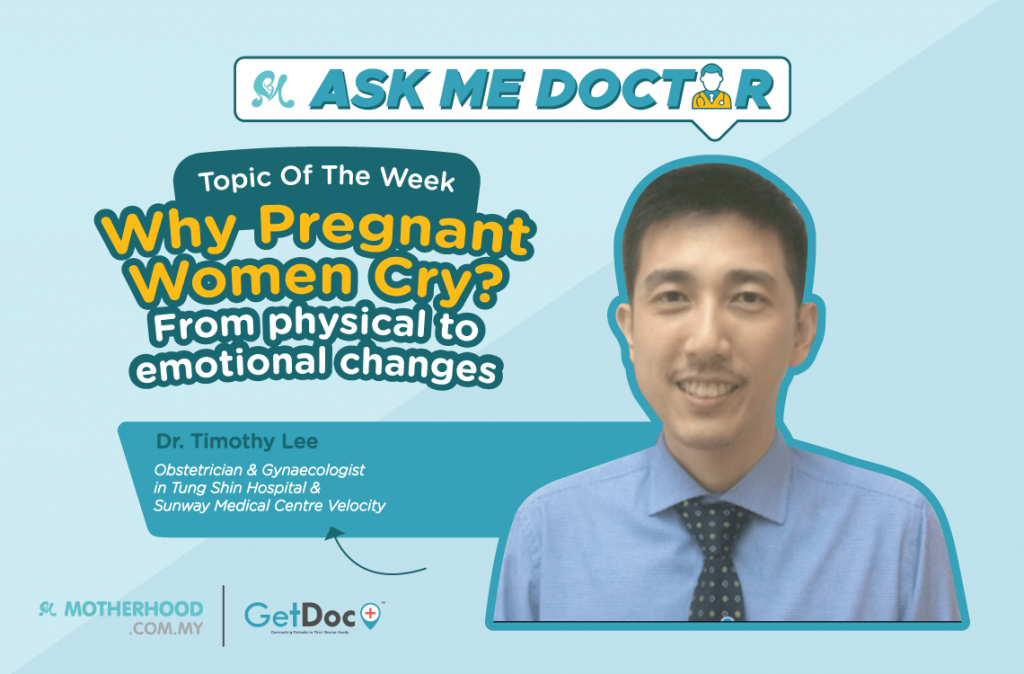Feeling like a roller-coaster ride? Pregnant mothers often complain that they cry more than usual and have mood swings during pregnancy.
Did you know that mood swings are normal? This occurs due to hormonal changes that rise and fall during pregnancy. Thus, moods may vary!
In this episode of AskMeDoctor, Dr Timothy, Obstetrician and Gynaecologist from Tung Shin Hospital and Sunway Medical Centre Velocity unveils 10 Questions about Emotional Changes during Pregnancy.
Q1: What are the common physical body changes that pregnant women experience?
Dr Timothy: Physical changes that are common in pregnancy are weight gain, skin changes and muscle aches.
Common skin changes include acne, rashes, pigmentation, stretch marks and itching. Pregnant women also commonly complain of backaches and pelvic pain.
Q2: Are pregnancy mood swings normal?
Dr Timothy: Yes, pregnancy mood swings are common and normal in most women.
Q3: Why does pregnancy mood swings happen?
Dr Timothy: Mood swings or moodiness can be attributed to multiple factors mainly physical stress, fatigue as well as changes in the body’s metabolism and hormones. These hormonal changes affect brain chemicals or neurotransmitters that regulate mood.
Q4: In which trimester will pregnant women experience mood swings?
Dr Timothy: Mood swings are mostly experienced during the first trimester, third trimester and towards the end of the pregnancy.
Q5: What are some methods to control mood swings when conceiving?
Dr Timothy: You can control mood swings by managing your stress.
- Get plenty of sleep during the night and take a nap during the day if you are exhausted.
- Eat well by having a balanced and healthy diet.
- Regularly exercise by either walking, swimming or participating in a yoga class.
- Spend time with your partner by indulging in activities that you enjoy together, such as watching movies, playing games or exercising together.
Lastly, don’t be so hard on yourself as mood swings are part of pregnancy and you are not alone. Hang tight, Mommies. Give yourselves a break!
Q6: What are the differences between mood swings and depression?
Dr Timothy: Red flag symptoms of depression are:
- recurrent anxiety and increase irritability
- sleep disturbances
- loss of appetite
- inability to concentrate
- short term memory loss
If your mood swings become more frequent, intense and persistent, you may need to consult a doctor.
Q7: Is it safe for pregnant mothers to take anti-depressants?
Dr Timothy: Antidepressants can be taken during pregnancy if the mother is suffering from depression. However, there are risks with these medications and they must be prescribed by a healthcare professional.
Patients will be counselled thoroughly regarding the risk and benefits of these medications and the importance of the treatment.
Q8: What should pregnant mothers do if they find out they’re pregnant while taking anti-depressants?
Dr Timothy: You need to see your doctor as soon as possible to discuss the implications of the medications and your mental health to the pregnancy and vice versa.
You will be managed concurrently by a psychiatrist and an obstetrician to ensure that both the mother and child receive optimal care.
Do alert your psychiatrist if you are planning to conceive as your medications can be changed and tailored to your needs.
Q9: What should pregnant mothers do to control their mood swings?
Dr Timothy: Mood swings in pregnancy are common and often unavoidable. However, you can keep moodiness in check by managing your stress. Keep an eye on early symptoms of depressions and seek medical attention promptly.
Q10: Emotional instability is common but what if the symptoms become severe after delivery? What should one do for herself or for his wife?
Dr Timothy: The post-delivery period or postpartum is often associated with intense physical and emotional changes leading to anxiety and mood disturbances.
It is imperative to identify early symptoms of postpartum depression. If left unchecked it may lead to psychosis, self-harm and even harm to the newborn.
Symptoms to be wary about are:
- Sudden mood swings
- Unexplained crying
- Irritability and impatience
- Sleep disturbances
- Sleep disturbances
- Anxiety
- Feeling of loneliness
- Vulnerability
Partners play an important role in identifying these symptoms as well as providing support to their wife during this trying postpartum period.
Now, we have reached at the end of this article and hopefully, this episode will widen your knowledge regarding mood swings during pregnancy.
Pretty sure, this pandemic affects some pregnant mothers more than ever but remember to maintain your mental health during MCO!
Last but not least, remember to seek advice from your doctor! Stay tuned with our AskMeDoctor series at Motherhood Story and our Facebook page.
